Welcome! This page describes the 2021/2022 version of the training.
The newest version of the EcoSattva Training is available now.
Learn more and register.
From the heart’s smallest jealousy to the devastation of global ecological crises, there is no suffering that this practice cannot meet. Join us in a journey of courageous discovery supported by wisdom, practice, science, and community.
Against the backdrop of a pandemic and state actors actively hostile to science, evidence of ecological breakdown unfolds all around us. While we take steps to demand racial justice, protect voting rights, or defend ecosystems, we can also invest in our inner resources. Each of us, with the support of community, can turn toward difficulty and transmute it into wise action. Supported by a diverse and rich set of teachers, we invite you to gather with others online and explore our respective edges, meeting all that arises in us and discovering an authentic way forward.
The EcoSattva Training has been specifically designed to support self-paced and self-scheduled participation, with core video teachings, contemplations, and inquiries. Participate as an individual or member of a small group and then, once a month, join all participants in our live gathering to connect with the global community of EcoSattvas-in-training.
‘The training was transformative for me… thought provoking, sensitive, deep and extremely nourishing to my heart and spirit. I also found it grounded in real world tools and practices. Most importantly — we have created a sangha and plan to continue meeting.’
Course Status and Key Dates
- There is a newer version of the training available. Learn more and register.
- All sessions of the training are now available and can be found on the Course Resources page.
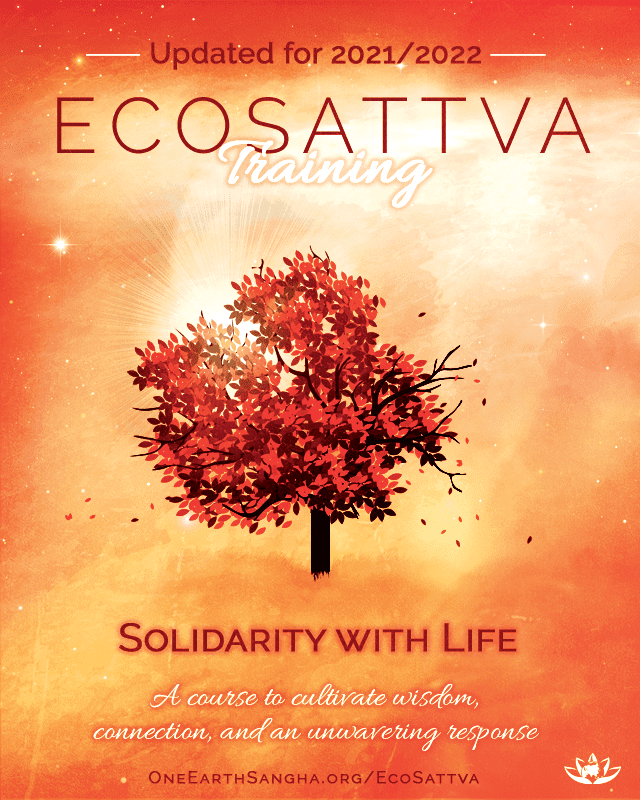
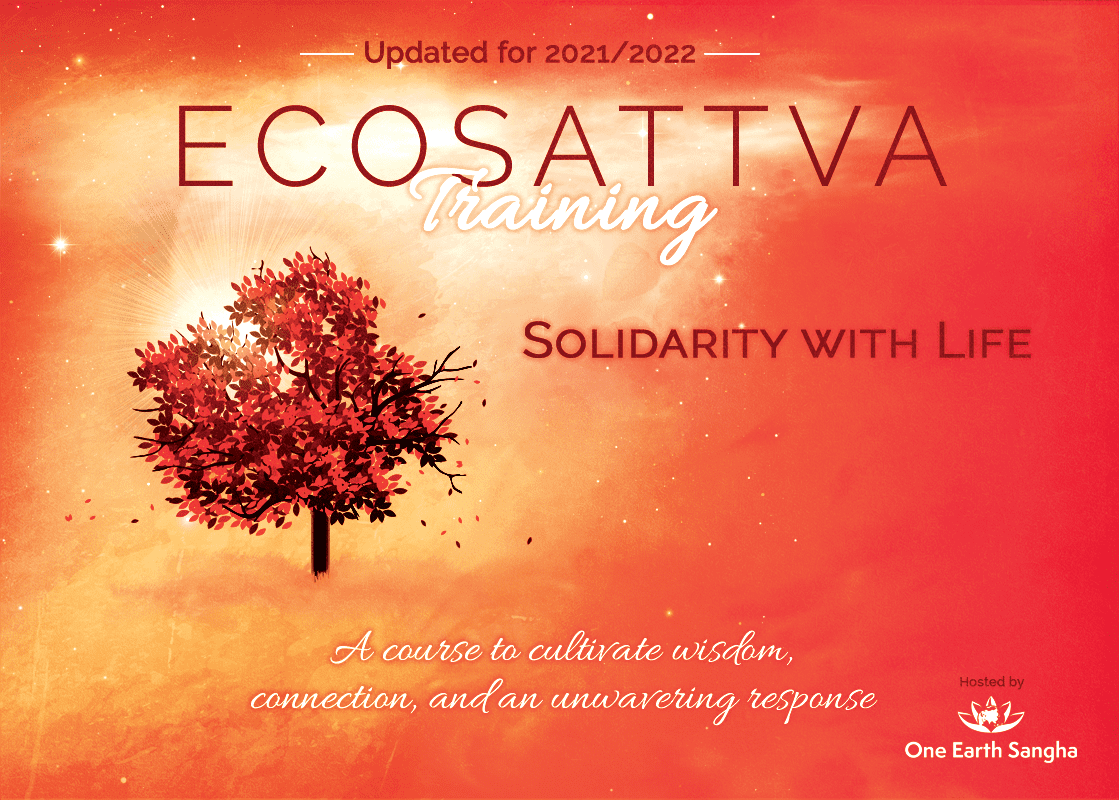
Contents
Solidarity with Life: The EcoSattva Training
No longer the stuff of scientific predictions based on computer models, the climate crisis is upon us, made plain not by trend lines but by the daily news. For more and more people around the world, this story is told not through a computer or TV screen but by the fire just over the hill, the flood at our doorstep, or perhaps only an ominous haze lingering in the sky.
With its desperate impacts on already marginalized human communities, the rise in our planet’s temperature is one of many dramatic ecological shifts underway. We bear witness to an unintended and tragic loss in global species diversity, the web of Earthly life eons in the making. It is as if countless gems in Indra’s Net are going dark.
Is it any wonder that our human hearts shake with grief, anger, and fear? Still, even amid so much loss, endless ecological wealth and potential remains. The living Earth community, including of course humanity, calls for restoration.
The radical proposition of the EcoSattva Training is that we are not relegated to helpless bystanders in this unfolding. By turning towards this difficult reality, supported by mindfulness, wisdom, practices, and community, we will discover the power to choose both our experience and our response. We can act on behalf of and in solidarity with life.
‘The Dharma is a terrific lens through which to view ecoactivism. This has helped me think about ways to help others who are either overwhelmed or think no action can be sufficiently effective and have given up.’
Overview of the Course
The EcoSattva Training is an eight-part series designed to support you in developing your response, internal and external, to a changing world. We’ll offer new insights from multiple Dharma traditions as well as the growing field of climate psychology as we soothe these tender bodies, hearts and minds. Supported by these teachings and one another, participants can discover and cultivate a way forward.
The course will begin at the level of our internal experience, a good place to start given our pervasive stress. Climate psychologists are demonstrating that these crises are traumatizing, with the attendant adaptations to trauma showing up in both our individual and collective defenses. We will spend time in this course understanding that dynamic and then bring in specific Dharma and trauma-informed practices that can relieve our ecological distress.
Having cultivated an inner landscape of kindness and calm, we’ll begin to challenge the views and patterns that only contribute to suffering, individually and collectively. We will explore the intersections between ecological harm with other forms of objectification and exploitation, especially in regards to race, revealing their common roots. We’ll then open to the spaces of potent uncertainty, allowing ourselves to lean in, let go, and listen to what wants to emerge. In the latter section of the course, we will explore diverse forms of response, from the surprisingly important changes we can make in our everyday lives, to the necessary refusals to cooperate with systems of domination, and everything in between.
Session Topics
There are eight core sessions that together create an archetypal journey to a place out beyond our familiar ways of looking, knowing, feeling and identifying. Guided by some of our community’s most profound leaders , we’ll be supported in opening up, letting go, and coming to terms.
- Session One: Gathering and Setting a Course with Kaira Jewel Lingo
We’ll begin by gathering and reflecting on our global situation, mapping out our journey, and setting the conditions for empowered, compassionate response. - Session Two: Cultivating Conditions for Transformation with Thanissara
In this journey we are likely to meet fear, grief, anger, and other difficult emotions. In investigating these strong energies, we can discover spiritual resources that can help us hold them. - Session Three: Compassionate Reflection with Kritee (Kanko)
We need to understand how it is we found ourselves in this astonishing situation. Understanding the causes and conditions that led us here can unlock an openness that is crucial to mindful engagement. - Session Four: Intersections in Racism, Colonialism, Patriarchy and Ecological Crises with Noliwe Alexander and Pennie Opal Plant
Ecological harm is inextricably tied to systems of oppression. Participants are invited to explore, with compassionate accountability, how the dominant structures objectify Earth and all her beings, ultimately harming all. - Session Five: Making a Home in Uncertainty with Lama Willa Miller
To be authentically helpful necessitates radical comfort with the unknown. We must metabolize our mind-boggling, heartrending situation and learn to recognize the endless possibilities contained therein. - Session Six: Creating and Discovering The Way with Adam Lobel
Continuing in the relational spiritual task, attunement with the unknown, we’ll open further to so much more than the conventional holding of that truth. We’ll welcome whatever arises, from nothing to mystical everything. - Session Seven: Expressing Our Awakening Agency with Yanai Postelnik
Equipped with a deeply rooted sense of our belonging and calling, we turn outward, discovering the domains of our EcoSattva action. - Session Eight: Going Forth with Myokei Caine-Barrett
In the closing session, we’ll return to our individual aspirations or visions to refine and affirm, and explore the boundless potential of Sangha as the heart of our engagement.
You’ll access each session on its own resources page including:
- Opening ritual
- Welcome from Kristin Barker or Lou Leonard
- Core Dharma offerings: video teachings from the session leader(s)
- Contemplations, inquiries, and other practices to help you internalize the teachings with body, mind, and heart.
- Resources for groups and individuals to make the most of the materials.
- Supplemental articles, videos, and Dharma sources relating to the content of the Session.
- Closing ritual
‘This group marks the beginning of social activism in my life. It is blossoming. Thank you for showing me how to keep my heart open and practice fierce compassionate action in this time of great challenge in our country and on our planet.’
Who is this for?
This course is for you if:
- you seek to develop well-being amid what can seem like an impossible situation;
- you are interested in a response to climate crises that is deeply rooted and meaningful;
- you want to build confidence that you can make a difference.
To understand the full context of the training, some interest in or experience with Buddhism will be helpful. But we encourage participants of any (or no) spiritual background to join.
What’s new in this version of the training?
While this version shares a substantial amount of content with the previous version of the training, you’ll find fresh inquiries and contemplations, richer supplemental resources, some updated videos, and an entirely new Session Three, featuring Kritee (Kanko). Registering for this new version also gives you access to our live monthly gatherings (held on the first Sunday of each month, 12:30 – 2:00 PM Eastern US Time). What’s more, those who have participated in any previous version of the training are eligible for a special 15% “Renewer” discount.
Many in our community return to this training again and again. It is never the same experience. Whether you are a new traveler or a seasoned explorer, we hope you’ll join us.
‘I see that, even though I am a long-term committed activist, there are many fears that I had not been willing to look at before. Now I have the courage, doing this in a group. This course really helped.’
Who Is Featured?
We are delighted and honored to feature the following leaders from across Western Dharma traditions.
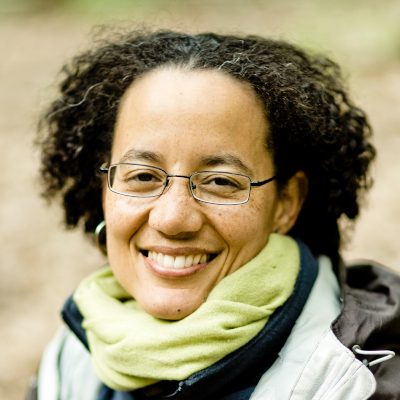
Kaira Jewel Lingo began practicing mindfulness in 1997 and teaches Buddhist meditation, secular mindfulness, and compassion internationally. After living as an ordained nun for 15 years in Thich Nhat Hanh’s monastic community, Kaira Jewel teaches in the Zen lineage and the Vipassana tradition, at the intersection of racial, climate and social justice with a focus on activists, Black/Indigenous/People of Color, artists, educators, families, and youth. Now based in New York, she offers spiritual mentoring to individuals and groups. She is author of the forthcoming We Were Made for These Times: Skilfully Moving through Change, Loss and Disruption (Parallax, November 2, 2021)
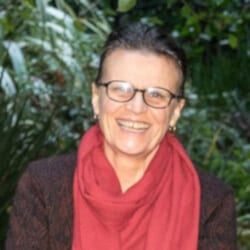
Thanissara embodies the integration of the contemplative with the activist. Trained in the Ajahn Chah Forest Tradition, she was a was a monastic for 12 years. She and husband Kittisaro founded Dharmagiri in South Africa where they integrated activism on AIDS while hosting month long retreats that synthesize Theravada and Mahayana, drawing from the Mantra, Chan, and Pure Land teachings and practices, in particular focused on the Quan Yin Dharma door through the transmission of Master Hsuan Hua. As member of the Spirit Rock Teacher Council, Thanissara later co-founded Sacred Mountain Sangha based in California. She has an MA in Mindfulness-Based Psychotherapy from the UK, and is author of several books, including Time to Stand Up: An Engaged Buddhist Manifesto for Our Earth — The Buddha’s Life and Message through Feminine Eyes.
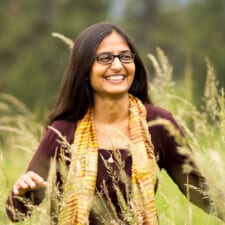
Kritee (dharma name Kanko), is a Buddhist Zen teacher, climate scientist, grief ritual leader, and social permaculture designer. She is cofounder of Boundless in Motion Sangha, a meditation community in the Buddhist lineage of Cold Mountain Zen. She is also a founding board member of Rocky Mountain Ecodharma Retreat Center, a center that brings meditation in nature together with dharma teachings for ecological action as well Frontline Farming, an advocacy group that lifts up people of color and women farmers and focuses on food cultivation, education, policy change and justice. As a senior scientist in the Climate Smart Agriculture Program at Environmental Defense Fund, she is helping to implement environment and climate-friendly methods of small farming at large scales in Asia with a three-fold goal of poverty alleviation, food security and climate mitigation / adaptation.
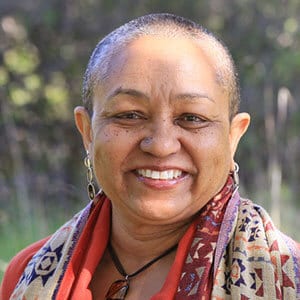
Noliwe Alexander has been a student of Vipassana meditation for close to 20 years. She is a Life & Business Coach dedicating both her coaching & Dharma practice to the POC, LGBT, At Risk and Elder communities. Noliwe is a teacher in training with Spirit Rock and an assistant teacher on CDL6. Noliwe is a wisdom keeper and humbled by the presence of her ancestor’s spirit that lives within and walks beside her.
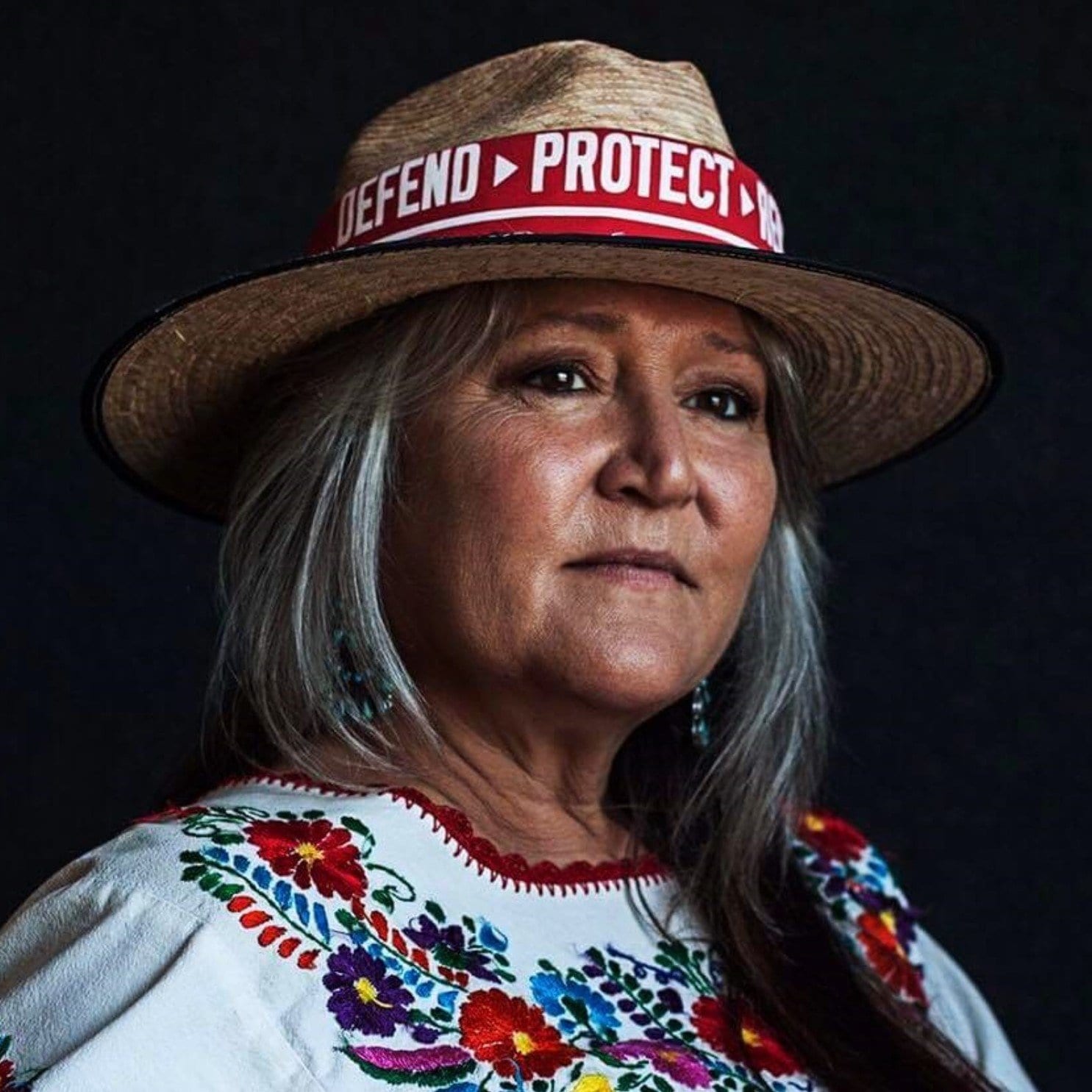
Pennie Opal Plant is one of the co-founders of Idle No More SF Bay, a co-founder of Movement Rights and a signatory of the Indigenous Women of the Americas Defending Mother Earth Treaty. She has worked for over 35 years to ensure that the sacred system of life continues in a manner that is safe, sustainable and healthy. Her mother is Yaqui and Mexican, her father undocumented Choctaw, Cherokee and European. No members of her family have ever lived on a reservation. She lives in unincorporated Contra Costa County and sees the Chevron refinery in Richmond, California every day.
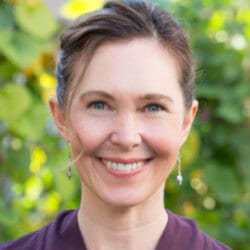
Willa is the Founder and Spiritual Director of Natural Dharma Fellowship in Boston, MA and its retreat center Wonderwell Mountain Refuge in Springfield, NH. She is Visiting Lecturer in Buddhist Ministry at Harvard Divinity School. As a writer and editor, her work has been published in Journal of the International Association of Buddhist Studies, Buddhadharma, and the Tibet Journal. Willa’s teaching interests include compassion, non-dual embodiment and contemplative care.
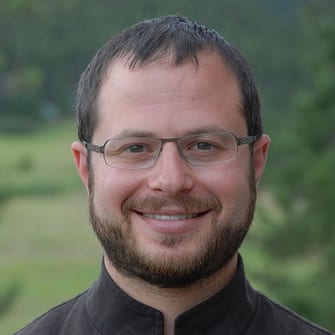
Adam served as a teacher (acharya) in the Shambhala tradition from 2005-2018; he designed the curriculum and trained teachers for the international Shambhala meditation centers. A speaker on ecology and spirituality at the United Nations, he was part of the first delegation of Buddhist teachers invited to the White House under President Obama. He leads ecodharma workshops called “Silent Transformations,” has taught in the Ecosattva Training, is a Greenfaith fellow, and is active in ecological and social justice movements. Adam’s teachings focus on Great Perfection Tibetan Buddhism, modern phenomenology, and inoperative studies (Heidegger, Foucault, Agamben). As a founding practitioner-educator at the City of Bridges High School, he has a longstanding interest in progressive contemplative education and transformative pedagogy. A professor of Buddhist and phenomenological psychology, he is curious about a cultural therapeutics for our collapsing society. He remains attuned-to an awakened, just, terrestrial society. Adam teaches a critical style of contemplative training that seeks to avoid enclosure in neoliberal mindfulness while still disclosing effortless awareness. He is currently developing what he calls “four fields” of contemplative practices for potential worlds.
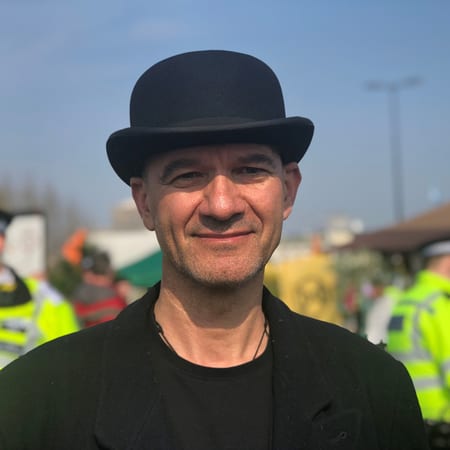
Yanai Postelnik has been engaged in full-time dharma practice and service since 1990. His practice and teaching are inspired by the Thai forest tradition and nourished by time spent in the natural world. Yanai has been teaching retreats around the world for 20 years. He serves as a guiding teacher of Gaia House, England and a core faculty member of Insight Meditation Society, Massachusetts. He is actively involved in Extinction Rebellion protests in the UK.
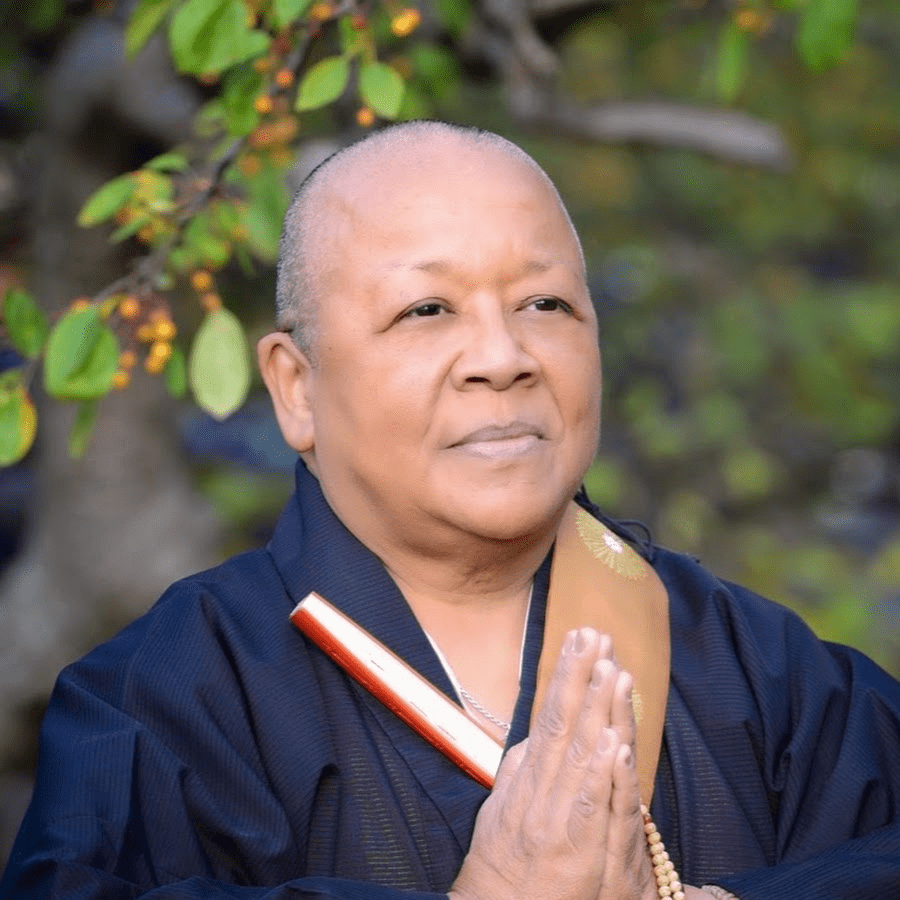
Myokei Caine-Barrett, Shonin, first encountered Buddhism in 1963. She has been practicing the Lotus Sutra ever since. In 2002 she began training to become a priest. She became head priest and guiding teacher of the Nichiren Buddhist Sangha of Texas in Houston, also known as Myoken-ji Temple, in 2007. Myokei Caine-Barrett has active prison and hospice ministries and deeply committed to healing our culture. She is currently bishop of the Nichiren Shu Order of North America.
Additional Contributors
The teachers and experts below have also made important contributions to the training.
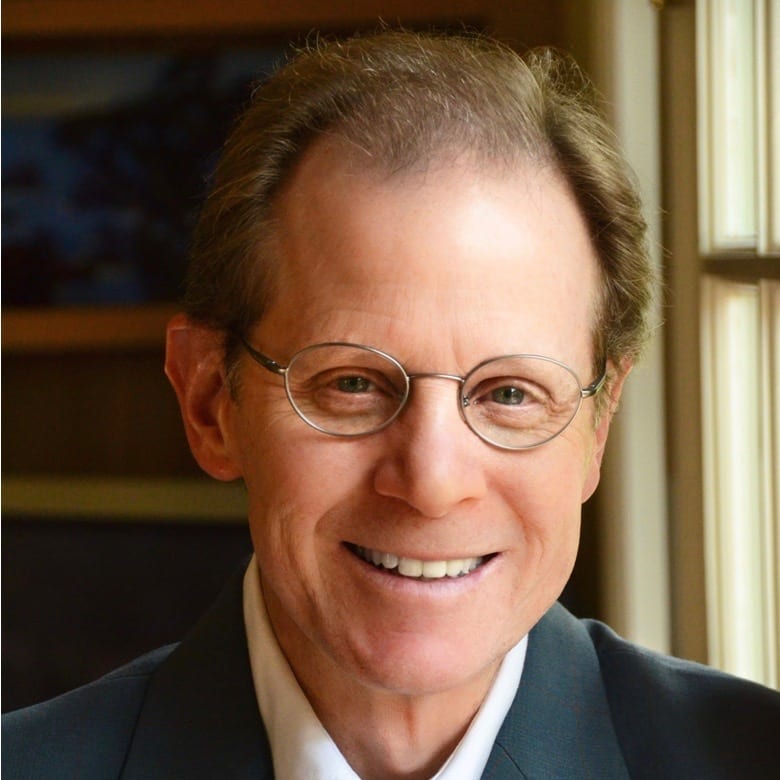
Daniel J. Siegel, MD, is the executive director of the Mindsight Institute and founding co-director of the UCLA Mindful Awareness Research Center. A graduate of Harvard Medical School, Dr. Siegel is a New York Times bestselling author of several books including Mind, The Mindful Brain, Parenting from the Inside Out, Aware, and the internationally acclaimed bestselling textbook The Developing Mind, which has been utilized by a number of organizations including the US Department of Justice and the Vatican. Dr. Siegel’s publications for professionals and the public have been translated into over 40 languages.
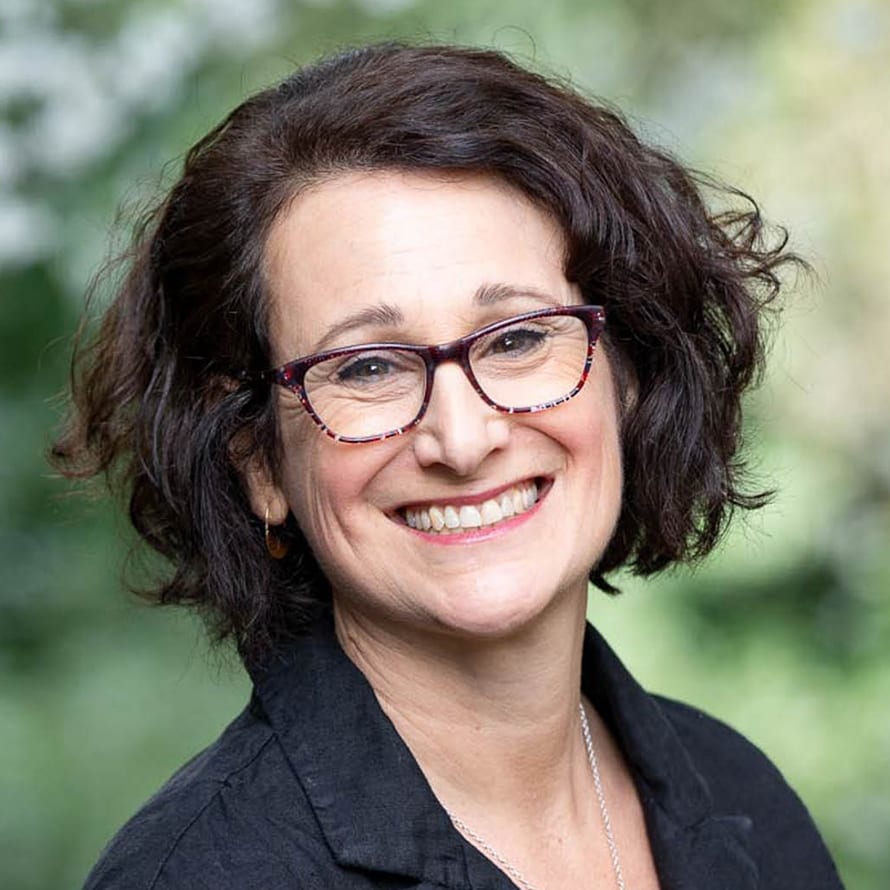
Renee Lertzman is an applied social scientist with expertise in environmental engagement and climate communications. Informed by her practice in the Insight tradition, she teaches and consults in the emerging field of climate psychology and is author of Environmental Melancholia: Psychoanalytic Dimensions of Engagement. Learn more about Renee’s work at ReneeLertzman.com
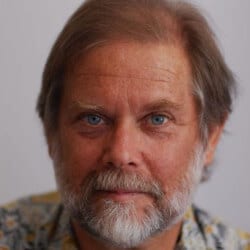
David Robert Loy is a professor, writer, and teacher in the Sanbo tradition of Japanese Zen Buddhism. A student of Yamada Koun and Robert Aitken, he was authorized to teach in 1988 and leads retreats and workshops nationally and internationally. He is author of EcoDharma: Buddhist Teachings for the Ecological Crisis and A New Buddhist Path: Enlightenment, Evolution, and Ethics in the Modern World, and he is co-editor of A Buddhist Response to the Climate Emergency. He is also director and vice-president of the Rocky Mountain Ecodharma Retreat Center.
‘As a queer climate and social justice activist on the buddhist path, the EcoSattva Training jumped out at me as a unique offering. Access to ongoing trainings, the centering of Black, brown, and queer voices in this space, and the thoughtful dialogue encouraged by Kristin and Lou are all huge assets of this offering. Much gratitude for holding space for deep, difficult conversations that enable the possibility of hopeful solutions.’
How Should Groups Use the Material?
Each session can easily support a group gathering of 60 to 90 minutes. We recommend that group members watch the session videos on their own before meeting, to maximize time for sharing and connecting. The meeting should provide time to do a brief opening, explore the provided inquiries, engage in discussion, cover logistics and close. You might choose to add an extended opening meditation. Each session will have its own page on our site that contains a sample agenda, the main video, a set of inquiries to choose from and supportive resources. Of course, groups are invited to use what works for them, removing and adding as will be most helpful.
Here’s a sample agenda for a 90-minute gathering:
- Opening: 30 min
- Group meditation
- Land acknowledgment and prayer
- Personal check-in
- Discussion and Practices: 45 min
- Reflect on the most recent session: 15 min
- Explore inquiries or contemplations, individually in meditation, journaling, in dyads or groups: 20 min
For group sharing methods, you might use 1-2-4-all, Conversation Cafe, or other approaches found on Liberating Structures - Discuss practices to explore between the current and next meeting: 10 min
- Closing: 15 min
- Logistics and host appreciation
- Silence or other ceremonial ending
- Dedication of merit
Our Group Facilitator’s Guide covers alternatives to this agenda, goes into more detail and offers helpful tools.
‘I really appreciated feeling like a part of a Sangha on the topic of Climate Change. I didn’t realize how alone and isolated I felt on this issue until I really felt the support of all of you and the broader community.’
Gratitude
In addition to the session leaders, we are so grateful to our guiding teachers and team members, who have combined their talents to bring this series to life. We would also like to thank Jeff Wessman of Inner Active Media for the video titles.